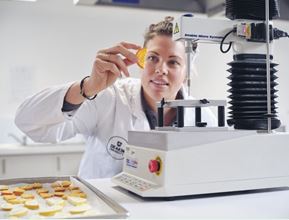Researchers have debunked the myth that healthy eating is costly by showing an average family can save $1800 a year by making more sustainable food choices at the supermarket.
The team from Deakin University’s School of Exercise and Nutrition Sciences compared the cost of a basket of groceries based on the Planetary Health Diet, which includes more fresh produce and less ultra-processed food, with a basket of groceries based on the typical Australian diet.
The baskets were costed at Coles supermarkets in metropolitan areas in each state, in a range of different socio-economic areas to allow affordability comparisons.
Ms Tara Goulding, who led the research as part of her Masters in Human Nutrition, said the Planetary Health Diet basket was cheaper than the typical Australian diet basket in all states and all metropolitan areas. It was also more affordable regardless of socio-economic area.
“We found that a family of two adults and two children could save more than $1800 a year on their household food budget simply by choosing healthier food based on the Planetary Health Diet,” Ms Goulding said.
“There is often a perception that eating a healthy diet that is also good for the environment is unachievable, partly because it will cost more.
“This study shows that Australians can be confident that it is more affordable to eat a healthy diet that supports the planet compared to what they might typically eat.”
The Planetary Health Diet comprises minimally processed food produced from sustainable food systems. Items in the Planetary Health Diet food basket included brown rice, oats, wholemeal grain bread, fruit and vegetables, nuts and meat (mainly chicken and fish) with beans and legumes also contributing to protein intake.
To assess affordability for different socio-economic groups, researchers compared the cost of groceries to the median income in low, medium, and high socio-economic areas in each state.
“Our research shows that low socio-economic households need to spend 17 per cent of their income on average to eat a healthy and sustainable diet but 21 per cent of their income to eat a typical Australian diet,” Ms Goulding said.
“Households in the higher socio-economic category only need to spend 11 per cent of their income to eat a healthy diet and 13 per cent to eat a typical Australian diet.
The findings have been published as The affordability of a healthy and sustainable diet: an Australian case study in a special issue of Nutrition Journal featuring articles relating to food, health and environmental sustainability.
“We really hope these results will convince shoppers that making healthier and more sustainable choices at the supermarket will not blow their food budget,” Ms Goulding said.
Media contact:
Pauline Braniff
Senior Media Coordinator, Deakin University
P: +61 3 5227 3586, M: 0418 361 890
pauline.braniff@deakin.edu.au
T: @DeakinMedia
This research appeared in multiple news outlets including The Age, Newcastle 2HD radio and Mercury.




